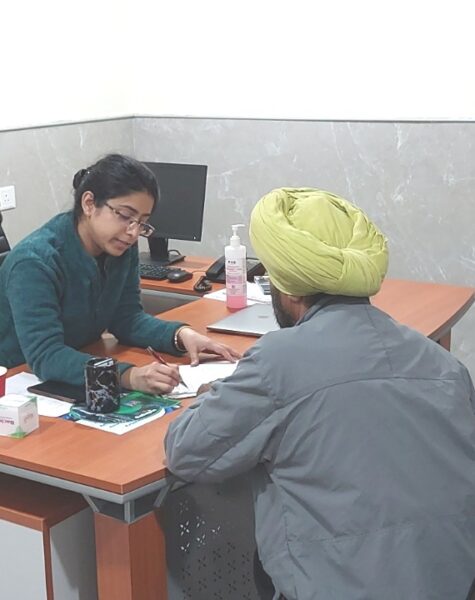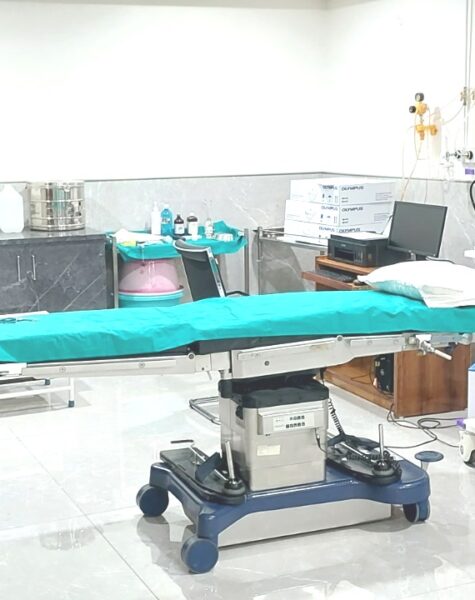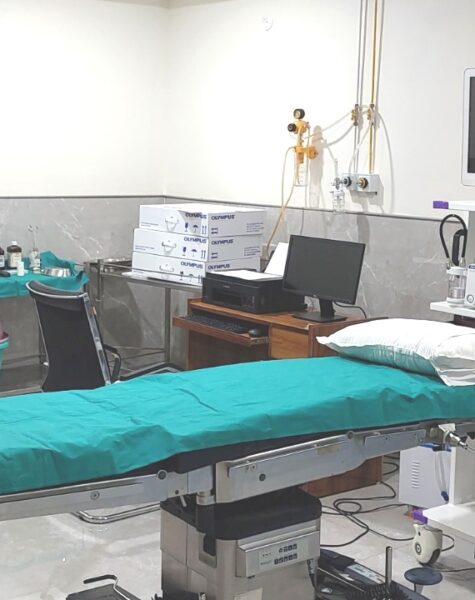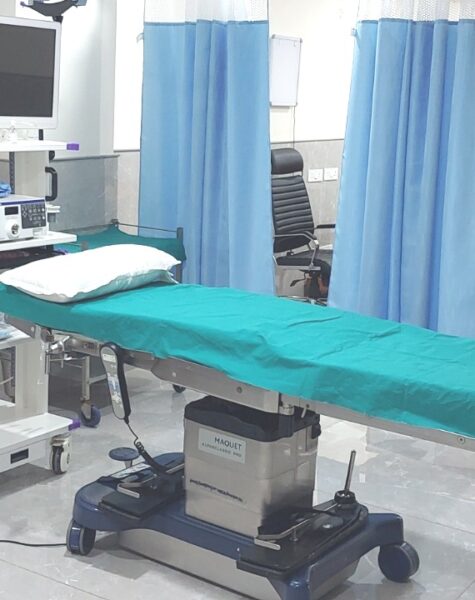Endovascular surgery and interventional radiology
 | Dr. Sachin MadaanProf. Interventional Radiologist & Endovascular Surgeon |
Dr Sachin Madaan has done his training in interventional radiology from All India Institute of Medical Sciences (AIIMS) after pursuing MBBS and DNB (Radiodiagnosis). He has expertise in catheter directed vascular procedures for neurological, body and peripheral pathologies as well as in non vascular procedures. His expertise in the use of imaging modalities also allows him to perform minimally invasive image guided procedures for diseases that could only be treated previously by surgery. He is focussed towards an ethical patient centric medical practice. He has an experience of 5 years in the field of interventional radiology. He has presented his work in many national conferences and published scientific papers
He is a member of
1. Indian Society of Vascular and Interventional Radiology
2. Indian radiology and imaging association
PREVIOUS EXPERIENCE
Consultant Interventional Radiologist at IVY Hospital, Mohali
1. Consultant Interventional Radiologist at Sohana Hospital, Mohali
2. Senior Resident in Interventional Radiology at AIIMS
PROFESSIONAL QUALIFICATION
1. PDCC in gastrointestinal Interventional Radiology at AIIMS, Rishikesh
2. DNB Radio-diagnosis at Jehangir Hospital, Pune
3. MBBS at MP Shah Medical College, Jamnagar
AREAS OF EXPERTISE
1. Carotid stenosis
2. Aortic aneurysm
3. Varicose Veins
4. Deep vein thrombosis
5. Diabetic foot
6. Peripheral artery disease
7. Uterine fibroid
8. Prostate enlargement
9. Varicocele
10. Central Vein Stenosis
11. Liver tumors
12. Breast and thyroid nodules
13. GI Bleed
14. Dialysis fistula complications
15. Aneurysms
Endovascular surgery and interventional radiology is a specialised branch of medicine in which the doctor performs minimally invasive procedures without surgery to relieve patients from specific diseases and symptoms. Treatment of following diseases is available at affording rates at Adesh medical college and hospital: – Varicose veins: Laser/ RFA/ venaseal treatment/ sclerotherapy – Peripheral artery disease/ diabetic foot: Angioplasty and stenting – Deep vein thrombosis: Pharmaco-mechanical thrombolysis/ IVC filter placement and removal – Renal/ Carotid stenosis: Angioplasty and stenting – Varicocele: Endovascular embolisation – Uterine fibroids/ enlarged prostate: Endovascular embolisation – Hemoptysis: Bronchial/ pulmonary embolisation – Dialysis fistula complications: fistuloplasty/ venoplasty – Aortic aneurysm: TEVAR/ EVAR – Cerebral aneurysm: Coiling – Hypersplenism: Endovascular embolisation – Liver/ Biliary cancer: Biliary drainages, CBD stenting, Liver ablation (Microwave, RFA)
- No surgery required
- No incision, no scar, no stitch
- Daycare/ short admission procedure, early discharge
- lesser chances of complications
- Highly effective, lesser chances of recurrence
Photo Gallery




As an AI language model, I am not able to provide personal support for gynecological issues. However, if you have concerns about your reproductive health or are experiencing symptoms such as pain, discomfort, or irregularities, it's important to seek help from a qualified gynecologist or healthcare professional.
A gynecologist is a medical doctor who is trained to evaluate, diagnose, and treat a wide range of conditions related to women's reproductive health. They can provide valuable guidance and support, helping you manage your condition and promoting overall wellbeing.
Neurology
Neurology is the branch of medicine that deals with the study and treatment of disorders of the nervous system, including the brain, spinal cord, and peripheral nerves. The nervous system controls and coordinates all of the body’s functions, and disorders of the nervous system can have a significant impact on a person’s quality of life.
Neurological disorders can be caused by a variety of factors, including genetics, infections, environmental toxins, and injuries. Some of the most common neurological disorders include stroke, epilepsy, Parkinson’s disease, multiple sclerosis, Alzheimer’s disease, and migraine headaches.
Neurologists are medical doctors who specialize in the diagnosis and treatment of neurological disorders. They may use a variety of tests and procedures, such as imaging studies, nerve conduction studies, and electromyography (EMG), to diagnose conditions. They may also prescribe medications or other treatments, such as physical therapy or cognitive-behavioral therapy, to manage symptoms and improve quality of life for patients.
In addition to medical treatment, lifestyle changes may also help manage neurological disorders. For example, regular exercise, a healthy diet, and stress management techniques may help reduce the frequency and severity of migraines. Similarly, physical therapy and occupational therapy can help individuals with neurological disorders regain function and improve their quality of life.
Overall, neurology plays a critical role in the diagnosis and treatment of neurological disorders, and individuals should seek medical attention if they experience symptoms such as persistent headaches, seizures, or memory loss. Early diagnosis and treatment can help improve outcomes and quality of life for individuals with neurological disorders.




If you or a loved one is experiencing symptoms of a neurological disorder or has been diagnosed with a neurological condition, there are a few things you can do to take care of yourself or help support their care:
Educate yourself: Learn as much as you can about the specific neurological disorder or condition, including its symptoms, causes, and available treatments. This will help you better understand what to expect and how to manage symptoms.
Follow your treatment plan: If you have been diagnosed with a neurological disorder, it's important to follow your treatment plan as prescribed by your neurologist. This may include taking medications as directed, attending regular appointments, and following lifestyle recommendations.
Manage stress: Stress can exacerbate neurological symptoms, so it's important to manage stress levels. This may include practicing relaxation techniques such as meditation or deep breathing, engaging in regular exercise, and getting enough sleep.
Seek support: Living with a neurological disorder can be challenging, and it's important to seek support from family, friends, or support groups. You may also consider speaking with a mental health professional to help manage any emotional or psychological effects of the condition.
Practice self-care: Taking care of yourself is essential for managing neurological disorders. This may include maintaining a healthy diet, getting regular exercise, engaging in enjoyable activities, and taking time for self-care activities such as reading, listening to music, or spending time in nature.
Overall, managing neurological disorders requires a holistic approach that includes medical treatment, lifestyle changes, and self-care. Working closely with a neurologist and developing a support network can help improve outcomes and quality of life for individuals with neurological disorders.
Support Contact us at Our Numbers
Contact
- NH - 44, Near Ambala Cantt., VILL. MOHRI, TEHSIL. SHAHBAD (M), DIST. KURUKSHETRA PIN 136135
- 0171-2700000 Ext:304
- surgery@amch.ac.in
- Emergency Contact+91 8222954101
- Ambulance 24*7 +91 8222954130
Brochures
View our Medical prospectus of
brochure for an easy to read guide on
all of the services offer.







